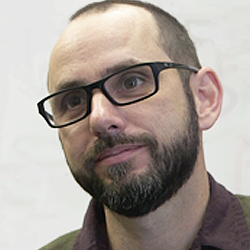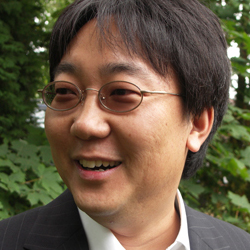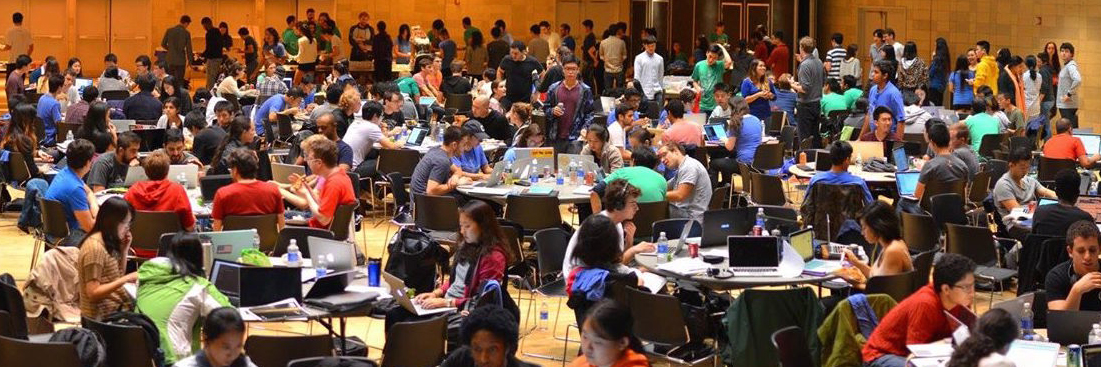Adam Cannon receives Great Teacher Award from The Society of Columbia Graduates
Update: Since being awarded the Presidential Award for Outstanding Teaching for Faculty, Adam Cannon has earned the additional honor of receiving the Great Teacher Award from the Society of Columbia Graduates. Since 1949, the award is given annually to two professors, one from Columbia College and one from Columbia Engineering, who demonstrate the ability to stimulate, challenge, and inspire students and relate positively to students beyond the classroom. This year Adam Cannon and Julie Crawford were named great teachers.

Adam Cannon and Jae Woo Lee, both lecturers in computer science, are to be recognized for excellence in teaching later this month. Cannon will receive the Presidential Award for Outstanding Teaching for Faculty, and Lee will receive the SEAS Alumni Association Distinguished Faculty Teaching Award.

Both Cannon and Lee are popular with students (each having earned a CULPA silver nugget) and respected for their teaching methods, their ability to inject humor and fun into what can be hard classes, their commitment to students inside and outside the classroom, and their efforts to continually explore ways to change computer science education.
Cannon, the Associate Chair for Undergraduate Education, teaches Introduction to Computer Science (1004) and Introduction to Computing for Engineers and Applied Scientists (1006), classes that number in the hundreds of students. But yet he is able to reach and excite students, making the often difficult concepts within computer science understandable to those just starting out. He often tells students that they might struggle for a bit but that it will eventually “click.” With Cannon as teacher, it almost always does.
Making computer science accessible to all students is a particular focus of Cannon’s. His Emerging Scholars Program, made up of equal numbers of female and male undergraduates, de-emphasizes programming to concentrate more on the collaborative and problem-solving aspects of computer science. Last year, he introduced Computing in Context (1002), a rigorous computer science class aimed specifically at liberal arts students; in a first of its kind, the course combines lectures in basic computer science skills with lectures and projects from humanities professors who show how those skills apply within a specific liberal arts discipline. By engaging liberal arts students on their own ground, Cannon has introduced a whole new group of students to computer science.
For some of these students, the class has been life-changing. Many have opted to continue onto more advanced computer science classes; some have changed their majors.
It is for these and other efforts that Cannon was chosen as one of five faculty members from across the university to receive the Presidential Award for Outstanding Teaching, which will be bestowed during the commencement ceremony May 18.

“I think computer science is a subject that today’s students are very drawn to. Since many students get their first exposure to computing in my course, I get a lot of credit that really belongs to our entire faculty and to the discipline itself,” says Cannon, adding also, “I gladly accept it.”
Jae Woo Lee, who previously (in 2011) won the Presidential Award as a PhD student, is this year being awarded the SEAS Alumni Association Distinguished Faculty Teaching Award. His selection is based on student evaluations and recommendations of a selection committee made up of three students and two alumni.
Lee started teaching in 2008 as a graduate student, filling in on short notice to lead Advanced Programming (3157), then notorious for its difficulty. Drawing on his own academic struggles, Lee sought an overall vision for helping students master fundamental skills and concepts, one that relied less on lectures and more on hands-on coding. He completely redesigned the syllabus, winnowing the number of topics and using the extra time for actual programming projects. A series of assignments he devised would build on one after another towards a single capstone project, culminating in a tangible, real-world application: a fully functional web server. A mailing list he set up encouraged online collaboration so students could help one another. Today, Advanced Programming is one of the most popular courses offered within the department.

In 2012, Lee received his PhD in Computer Science and chose to remain at Columbia where today he teaches also Essential Data Structures (3136) and sometimes Operating Systems (4118). His stated goal is to turn students of programming into programmers; students’ enthusiastic comments recommending the class to others suggest Lee has been successful. Not content to rest, Lee is taking another look at the undergraduate computer science curriculum.
“Last year, in preparation for a panel on CS curriculum that I was set to moderate at our faculty retreat, I solicited comments from our students. The mailing list exploded with huge number of incredibly thoughtful comments and suggestions,” said Lee. “We haven’t forgotten them. It’s just that we’re a little busy dealing with quadrupled enrollments in our courses . . .” Lee is working on one of them though: a new course to cover some important topics that fall between Advanced Programming and Operating Systems.
The two awards won by Cannon and Lee represent something of a streak for the Computer Science department. It is the second time in the past four years a department faculty member has won the Presidential Award, the University’s highest award for teaching (Rocco Servedio received it in 2013); in eight of the past nine years, the SEAS Alumni Distinguished Faculty Teaching Award has been bestowed on someone from the department.
“We are incredibly proud to have two such wonderful people as Adam and Jae, teaching and mentoring our students,” says Julia Hirschberg, chair of the Computer Science Department. “It is due in great part to their contributions that the department has achieved such a high quality of teaching.”
Posted 5/5/2016
– Linda Crane

